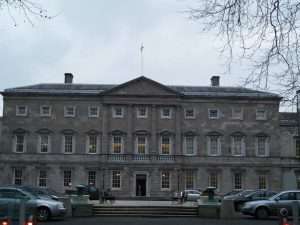A Fine Gael majority might be welcome
An opinion poll in yesterday’s Sunday Times pointed to a sharp increase in the level of the support for Fine Gael, it led to analysis that suggested that the senior government party might expect to win sixty-four seats in the next Dáil. Sixty-four is fifteen seats short of the seventy-nine the party would need for its first ever overall majority, it is a prospect at which many on the Left might recoil, but wouldn’t a full-blown conservative government be good for Irish politics?
When I was a student at the London School of Economics, interest in Irish politics or history among most of my lecturers ended with the 1921 Treaty. At that point Ireland had gone its own way and apart from the vexed question of the North/Northern Ireland/Ulster/the Six Counties, there was not much that caught the attention. But for a brief period at that time, there was a spark of interest among the academics who taught me. Ireland had three general elections in eighteen months. Like two old heavyweight boxers trying to pound each other into submission, Charles Haughey and Garret Fitzgerald trod streets, and stood on platforms, and made countless speeches. On 24th November 1982, Garret Fitzgerald gained the upper hand and formed a government that was to last until 1987.
The politics lecturer believed part of the instability in those opening years of the 80s was due to the fact that there was no ideological difference between the two main parties, it was an issue of personalities. He recounted a tale from the European Parliament in 1973. At the formation of the new parliament, it was alleged, both Fianna Fail and Fine Gael had applied to become members of the Christian Democrat grouping at Strasbourg. The story goes that the Fianna Fail application arrived earlier and was placed in an “in tray”, the Fine Gael application was later, and was placed in the “in tray” above that of their opponents. When the letters were opened, the Fine Gael application was considered first and they were admitted to the grouping, leaving Fianna Fail without membership of a significant parliamentary group.
Whether or not the story is apocryphal, it captures the fact that the battleground has not been clear, that both the main parties belong to the centre-right, and that proper debates have been difficult when government and opposition hold similar beliefs.
A Fine Gael majority government would probably leave a Left-wing grouping led by Sinn Fein as the opposition. Wouldn’t this allow the development of a proper political discourse? Might we not have politics based on ideas, rather than voting based on family loyalties in a Civil War a century ago, or for candidates who come with promises of local favours?
Jesus once told people that they should let there “yes” be yes” and let there “no” be “no.” It is much easier to fulfil that command when it is clear to what we might be saying “yes” and to what we might be saying “no.”



The idea of a Fine Gael majority government would be good for neither the Irish people nor Irish politics especially if the opposition came from any group led by Sinn Fein. We’ve had five years of what has been, effectively, a Fine Gael government (Labour has given almost everything FG wanted). As a result we have growing inequality, a record number of people homeless, Harney’s record on people on hospital trolleys has been broken even before a winter crisis, cuts in the health service that will make things even worse in 2016 and an alienation in working class areas that is worse than ever. Election promises from FG recall the worst excesses of Charlie McCreevy with promised income tax and USC cuts reducing the tax base to below Celtic Tiger levels – and we know where that led us. I don’t know if the health and education services could survive another 5 years of Fine Gael.
The idea that Sinn Fein is a left wing party is a joke. In the recent UK election they played the sectarian card in North Belfast and showed their true colours. In the Republic we’ve seen their leader’s (Fuhrer’s?) response to Slab Murphy’s conviction for tax evasion – hardly a left-wing response. I believe that Sinn Fein’s values are closer to the Front National than to Syriza.
But any politics based on ideas has to be better than the current system of cronyism, nepotism and strokes
I’m not happy with the current system and I don’t know who I’m going to vote for only who I’ll be voting against when the election comes. I agree we need a change in politics but I would not be happy with a politics based on Sinn Fein’s essentially populist and, when push comes to shove sectarian, nationalist ideas. I write this as I hear the latest paean of praise to Thomas Slab Murphy from a leading Sinn Fein politician, Martin McGuiness. At least the Anti-Austerity Alliance and People Before Profit are offering an alternative politics without the whiff of cordite still around Sinn Fein (and I’m not a fan of their inspiration Leon Trotsky).